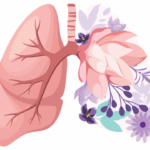
Gut microbiota is closely related to lung antiviral immunity
Strategies for Respiratory Health
Recently, people of all ages have experienced a range of respiratory illnesses, including respiratory syncytial virus (RSV) and pneumonia, particularly bacterial pneumonia. Symptoms and duration vary from person to person, depending on age, overall health status, and history of previous lung conditions.
Globally, RSV accounts for 31% of pneumonia cases, 33 million acute respiratory infections, 3.1 million hospitalizations, and 118,200 deaths annually, making it the third leading cause of lower respiratory deaths in children under five. Overall, respiratory infections are the primary cause of death and life-threatening conditions worldwide. In addition to microbial causes, respiratory diseases such as asthma and chronic obstructive pulmonary disease (COPD) are becoming increasingly common.
One important but often overlooked causation is the gut-lung axis. The lungs were long believed to be sterile until approximately 15 years ago, when researchers discovered they house their own microbiome. The gut-lung axis is bidirectional, influencing the progression of intestinal and lung diseases.
Gut microbiota is closely related to lung antiviral immunity, and recent evidence suggests that dysbiosis is also involved in the development of an RSV infection. The composition of the lung microbiome affects disease occurrence, progression, and prognosis. Additional causes of lung disorders include air pollution, indoor air quality, smoking, environmental toxins, age, family history, poor nutrition, and lifestyle. Antibiotics and other medications, a diet high in sugars and refined carbohydrates, a lack of pre- and probiotics in the diet, chronic constipation or diarrhea, and mental and emotional stress contribute to dysbiosis, all negatively affecting the gut-lung axis. Interruption in the bidirectional gut-lung crosstalk has a causative role in developing respiratory diseases in people of all ages.
WAYS TO PROTECT THE LUNGS AND PREVENT RESPIRATORY DISORDERS
VITAMIN D has been found to help prevent lung disorders and improve lung function.
CAROTENOIDS are essential for overall health. Their health-promoting properties are widely present in our food and are linked to decreased chronic diseases, including respiratory diseases. The most vital carotenoids in lung protection include beta-carotene, alpha-carotene, lycopene, lutein, and zeaxanthin. These have antioxidant and anti-inflammatory properties, potentially reducing
the risk of respiratory illnesses.
VITAMIN C is used to treat various disorders associated with oxidative stress, inflammation, and immune dysregulation. Studies have shown that it is preventive and therapeutic in the treatment of respiratory disorders, including asthma, COPD, and lung infections.
N-ACETYLCYSTEINE (NAC) has antioxidant and anti-inflammatory properties. RSV is one of the most common causes of lower respiratory tract infections, and exposure to air pollution is associated with higher RSV incidence and disease severity. NAC improves the epithelium (lung protective barrier) against inhaled pathogens and irritants and is effective in preventing and treating other viral
and bacterial respiratory infections.
PREBIOTICS are indigestible food components that nourish beneficial gut bacteria and play a role in improving lung health through the gut-lung axis by modulating immune responses and reducing inflammation. Fermentation of prebiotics produces short-chain fatty acids (SCFAs), such as butyric acid, which have been shown to decrease systemic inflammation and play a protective role in chronic respiratory conditions.
PROBIOTICS, as new research suggests that probiotics, particularly certain Lactobacillus strains, may reduce the incidence, duration, and severity of respiratory tract infections by modulating the gut-lung axis and improving immune function. A preliminary study showed that administration of probiotics protected against RSV by suppressing the infection and exerting an antiviral response.
OMEGA-3 FATTY ACIDS (EFAs) help maintain lung health. EFAs have anti-inflammatory properties, which can help reduce inflammation and improve respiratory function.
MULLEIN TEA has been used traditionally for respiratory conditions such as coughs, colds, and asthma. It is a natural expectorant that helps with mucus elimination and eases breathing and coughing.
LUNG SUPPLEMENT SUPPORT FOR CHILDREN: Supplements that can help prevent and support respiratory diseases in children include probiotics, vitamin D drops, chewable vitamin C, and liquid omega-3 EFAs.
Our diet and lifestyle are the pillars of our overall health, but we must not overlook the importance of water and staying adequately hydrated. The mucous membranes of the respiratory tract need adequate hydration to trap foreign toxins and pathogens, thereby preventing infections and lung irritations.














